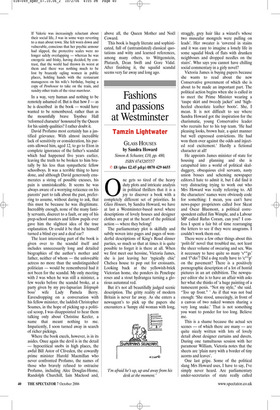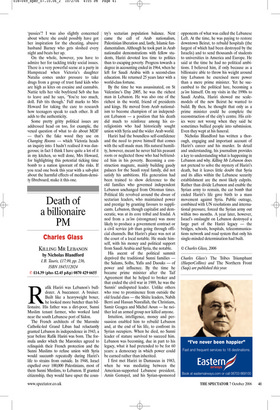Fashions and passions at Westminster
Tamzin Lightwater
GLASS HOUSES by Sandra Howard Simon & Schuster, £10, pp. 480, ISBN 0743285557 ✆ £8 (plus £2.45 p&p) 0870 429 6655 One gets so tired of the heavy duty plots and intricate analysis in political thrillers that it is a joy to discover a book with a completely different set of priorities. In Glass Houses, by Sandra Howard, we have at last a Westminster-based novel where descriptions of lovely houses and designer clothes are put at the heart of the political action — where they belong!
The parliamentary plot is skilfully and subtly woven into pages and pages of wonderful descriptions of King’s Road dinner parties, so much so that at times it is quite possible to forget it is there at all. When we first meet our heroine, Victoria James, she is just leaving her ‘typically chic’ Chelsea house to pop out for croissants. Looking back at the yellowish-brick Victorian home, she ponders its Penelope roses and a stout hydrangea turning a glorious autumnal red.
But it’s not all beautifully judged scenic description. The gritty reality of modern Britain is never far away. As she enters a newsagent’s to pick up the papers she encounters a ‘lumpy old woman with long, straggly, grey hair like a wizard’s whose two muscular mongrels were pulling on leads’. Her sweater is ‘covered in stains and it was easy to imagine a lonely life in some squalid block of flats with drunken neighbours and dropped needles on the stairs’. Who says you cannot have chilling social commentary in a girly novel?
Victoria James is buying papers because she wants to read about the new Conservative government of which she is about to be made an important part. The political action begins when she is called in to meet the Prime Minister wearing a ‘taupe skirt and tweedy jacket’ and ‘highheeled chocolate leather boots’. She, I mean. It is not difficult to see where Sandra Howard got the inspiration for the charismatic, young Conservative leader who recruits her to his top team. ‘He had pleasing looks, brown hair, a quiet manner but well expressed convictions. He had won them over against the odds and injected real excitement.’ Hardly a fictional character at all!
He appoints James minister of state for housing and planning and she is catapulted into a world of political skulduggery, obsequious civil servants, nasty union bosses and scheming newspaper editors.I hate to admit it, but I did find it very distracting trying to work out who Mrs Howard was really referring to. All the characters’ names were obviously code for something: I mean, you can’t have news-paper proprietors called Ivor Skeat and Oscar Bluemont, a political correspondent called Jim Wimple, and a Labour MP called Rufus Coram, can you? I confess I spent a fair bit of time rearranging the letters to see if they were anagrams. I couldn’t work them out.
There were a few other things about this ‘polit-lit’ novel that troubled me, not least the sheer volume of swearing and sex. Was it necessary to have quite so many ‘s**gs’ and ‘f*cks’? Did a dog really have to ‘c**p’ on the pavement? There is a positively pornographic description of a lot of horrid pictures in an art exhibition. The newspaper editor she is to have an affair with asks her what she thinks of ‘a huge painting of a tumescent penis. “Not my style,” she said. “Too up front.” ’ As if that was not bad enough: ‘She stood, unseeingly, in front of a canvas of two naked women sharing a very long snake.’ That is not something you want to ponder for too long. Believe me.
This is a shame because the actual sex scenes — of which there are many — are quite nicely written with lots of lovely detail about designer curtains and duvets. During one tumultuous session with her paramour William, Victoria notes that the sheets are ‘plain navy with a border of tiny acorns and leaves’.
One last gripe. Some of the political slang Mrs Howard uses, I have to say, I’ve simply never heard. Are parliamentary under-secretaries of state really called ‘pussies’? I was also slightly concerned about where she could possibly have got her inspiration for the cheating, abusive husband Barney who gets sloshed every night and beats her up.
On the whole, however, you have to admire her for tackling tricky social issues. There is a very powerful scene at a party in Hampstead when Victoria’s daughter Natalia comes under pressure to take drugs from a group of trust fund kids who are high as kites on cocaine and cannabis. Nattie tells her vile boyfriend Seb she has to leave and he says, ‘You’re too much, doll. Fab tits though.’ Full marks to Mrs Howard for taking the care to research how teenagers speak to each other. It all adds to the authenticity.
Some pretty gritty political issues are addressed head on too, for example, the vexed question of what to do about MDF — that’s the fake wood they use on Changing Rooms — which Victoria heads an inquiry into. I hadn’t realised it was dangerous; in fact I think I have quite a lot of it in my kitchen, so well done, Mrs Howard, for highlighting this potential ticking time bomb to a nation ignorant of the risks. If you read one book this year with a sub-plot about the harmful effects of medium-density fibreboard, make it this one.



















































































 Previous page
Previous page